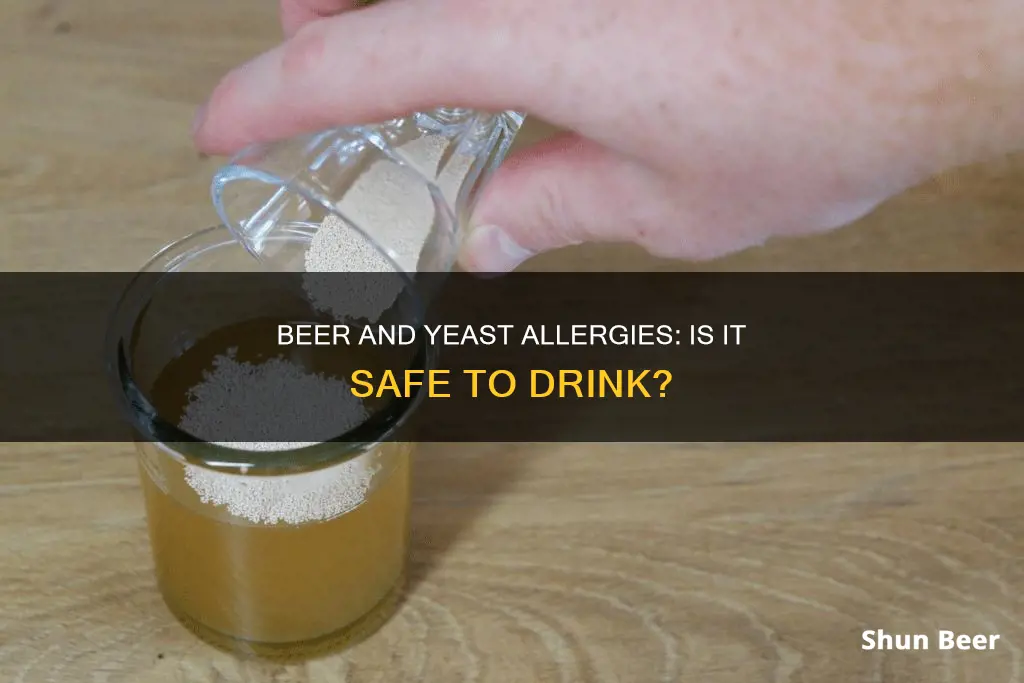
It is possible to be allergic to beer, but true beer allergies are rare. If you are allergic to yeast, you may be able to drink beer depending on the type of yeast used in the brewing process. The most common yeast used in beer is brewer's yeast, which is a type of fungus. Other types of yeast used in beer include Saccharomyces cerevisiae, Saccharomyces pastorianus, Brettanomyces spp., and Torulaspora delbrueckii. If you are allergic to any of these specific types of yeast, then you should avoid beer that contains them. However, distilled spirits are generally safe for people with yeast allergies, as the distillation process usually removes any naturally occurring yeast or yeast by-products.
| Characteristics | Values |
|---|---|
| Allergies vs. Intolerance/Sensitivity | A true allergy is an immune system response. Intolerance or sensitivity is a digestive system response. |
| Allergy Symptoms | Hives, itching, swelling, stomach cramps, dizziness, vomiting, diarrhea, loss of consciousness, anaphylaxis. |
| Intolerance/Sensitivity Symptoms | Gas, bloating, diarrhea, constipation, cramping, nausea, hives, sneezing, wheezing, abdominal pain. |
| Beer Ingredients | Water, malt barley, brewer's yeast, hops, assorted flavorings, colorings, preservatives. |
| Common Beer Allergens | Grains (e.g. wheat, barley, sorghum, rye, oats), gluten, histamines, sulfites, yeast. |
| Yeast Allergy Symptoms | Hives, digestive symptoms, serious allergic reactions. |
| Diagnosing Allergies | Skin prick test, blood test, food and symptom diary, elimination diet. |
What You'll Learn

Beer allergy vs intolerance
Beer allergies are relatively rare, and many people who think they have a beer allergy are actually experiencing an intolerance or sensitivity to one or more of its ingredients. However, it's important to understand the distinction between a beer allergy and a beer intolerance, as the two conditions differ in their causes and symptoms.
A beer allergy is an overreaction of the immune system to a specific substance in beer, such as a food protein or other allergen. The immune system mistakenly identifies certain components in beer as harmful and triggers an allergic response, which can be severe and potentially life-threatening. True food allergies cause symptoms such as hives, itching, swelling, stomach cramps, dizziness, vomiting, and diarrhoea. In the most severe cases, a food or drink allergy can lead to anaphylaxis, a life-threatening condition requiring immediate medical attention.
On the other hand, a beer intolerance, also known as a beer sensitivity, is a non-allergic adverse reaction to one or more compounds present in beer. It is a digestive or metabolic issue that occurs when the body lacks specific enzymes or has difficulty breaking down certain compounds within the beer. Beer intolerance does not involve the immune system and is usually not life-threatening. However, it can still cause unpleasant symptoms, such as digestive issues, skin rashes, and respiratory problems. Symptoms of beer intolerance include bloating, gas, diarrhoea, nausea, rashes, hives, congestion, wheezing, and difficulty breathing.
If you experience symptoms after drinking beer, it is important to consult a medical professional to determine whether you have a beer allergy or a beer intolerance. They may recommend allergy testing, such as skin prick tests or blood tests, to help identify the specific triggers.
In terms of treatment, the best way to manage a beer allergy or intolerance is to avoid beer or any other food products that contain the specific allergens or triggers. For mild symptoms, an over-the-counter antihistamine may help, while more severe symptoms may require a prescription antihistamine or an adrenaline autoinjector.
Keto and Beer: Best Brews for Your Low-Carb Diet
You may want to see also

Symptoms of a yeast allergy
- Rashes or skin irritation
- Anaphylaxis, causing a swollen throat and/or difficulty breathing
- Breathing difficulties
- Abdominal pain and bloating
- Tightness of the chest
- Mood disorders
- Ear infections
- Difficulty concentrating
It is important to note that a yeast allergy is different from yeast hypersensitivity, which may not involve a true allergy. Yeast allergies are rare, and there is limited scientific research on them. If you suspect you have a yeast allergy, it is best to consult a doctor or allergist for testing and confirmation.
Beer and Running: Is It Safe to Run After Drinking?
You may want to see also

Diagnosing a yeast allergy
Firstly, it's important to understand the difference between a true food allergy and a food intolerance or sensitivity. A true food allergy causes an immune system response, leading to symptoms such as hives, itching, swelling, stomach cramps, dizziness, vomiting, and diarrhoea. In severe cases, allergies can also cause life-threatening reactions such as anaphylaxis. On the other hand, food intolerances or sensitivities are typically less serious and are triggered by the digestive system. Symptoms often include digestive problems like gas, bloating, diarrhoea, constipation, cramping, and nausea.
If you experience allergy-like symptoms after consuming yeast, it's recommended to see a doctor or allergist. They can perform a variety of tests to help determine if you have a yeast allergy or intolerance.
One common test is the skin prick test, where a small drop of the suspected allergen is placed on the skin and pricked through the first layer with a needle. Another test is the intradermal skin test, where the allergen is injected into the tissue beneath the skin. Blood tests, such as the RAST test, can also be used to measure the amount of immunoglobin E (IgE) antibody in the blood, with high levels indicating a possible allergy.
A more definitive test for food allergies is the food challenge test, where a person is given increasing amounts of the suspected allergen while being monitored for a reaction. An elimination diet can also be used, where the suspected allergen is removed from the diet for a period and then slowly reintroduced while observing for symptoms.
If you suspect a yeast allergy, it's important to work with a medical professional to determine the cause of your symptoms and find healthy ways to remove yeast from your diet if necessary.
Beer and Stomach Flu: What's Safe to Drink?
You may want to see also

Managing a yeast allergy
If you have a yeast allergy, it's important to take steps to avoid exposure to yeast and manage your symptoms. Here are some tips to help you steer clear of yeast and manage your allergy effectively:
- Read labels carefully: Always check the ingredient lists on food and beverage labels for yeast or other potential allergens. Look out for terms like "brewer's yeast" or "baker's yeast".
- Avoid fermented foods and beverages: Yeast is commonly used in the fermentation process, so it's best to avoid fermented foods and drinks such as beer, wine, hard cider, and sake. Opt for distilled spirits, as the distillation process typically removes yeast and yeast by-products.
- Be cautious of craft beers: Craft beers can contain unconventional ingredients, including different types of yeast, that may trigger a reaction. Research the ingredients before consuming any craft beer.
- Avoid cross-contamination: If you have a severe yeast allergy, be mindful of potential cross-contamination risks, such as shared utensils or preparation surfaces that may have come into contact with yeast.
- Carry an adrenaline autoinjector: If you are at risk of a severe allergic reaction (anaphylaxis), your doctor may prescribe an adrenaline autoinjector (epinephrine pen) to carry with you at all times. This can save your life in the event of a severe allergic reaction.
- Seek medical attention: If you experience any symptoms of an allergic reaction, such as hives, itching, swelling, abdominal pain, dizziness, or difficulty breathing, seek immediate medical attention. Don't wait for the symptoms to go away on their own.
- Get tested for allergies: If you suspect you have a yeast allergy, consult a medical professional, such as an allergist, to get tested. They may perform skin prick tests or blood tests to confirm the allergy.
- Opt for yeast-free alternatives: Choose yeast-free alternatives to fermented foods and beverages. For example, instead of beer, you can try hard ciders, non-alcoholic drinks, cocktails, or mocktails.
- Be mindful of mould allergies: Yeast allergies often occur in people with mould allergies. If you have a yeast allergy, you may also want to take steps to avoid exposure to mould.
- Avoid yeast-containing baked goods: Some people with yeast allergies can tolerate yeast in baked goods, but it's important to be cautious as the amount of yeast and the type of yeast used can vary.
Beer and Dulcolax: What You Should Know
You may want to see also

Yeast allergy misconceptions
All adverse reactions to beer are allergies
This is not accurate. While true beer allergies exist, many adverse reactions are intolerances or sensitivities to specific ingredients in beer.
Beer allergies are widespread
In reality, true allergies to beer are relatively uncommon. Most people who experience discomfort after consuming beer are likely dealing with an intolerance or sensitivity.
Gluten is always the culprit
While gluten intolerance (such as coeliac disease) can cause adverse reactions to beer, there are other potential triggers, including yeast, sulphites, and even certain grains used in the brewing process.
Firstly, it is important to note that true yeast allergies are rare. However, they do exist and can be severe. If you have a yeast allergy, it is important to be aware of the misconceptions surrounding yeast allergies and to take precautions to avoid exposure to yeast.
One misconception is that all fermented foods and beverages contain yeast. While it is true that many fermented products, such as beer, wine, and bread, contain yeast, there are also many fermented foods that do not. For example, products such as sauerkraut, kimchi, and kombucha are typically yeast-free.
Another misconception is that all types of yeast will trigger an allergic reaction. There are many different types of yeast, and not all of them will cause an allergic reaction in individuals with a yeast allergy. For example, baker's yeast and brewer's yeast are two common types of yeast that are often implicated in yeast allergies. However, there are also yeast-like fungi, such as Saccharomyces boulardii, that may be better tolerated by some individuals with yeast allergies.
It is also important to note that not all yeast-containing products will trigger an allergic reaction in individuals with a yeast allergy. The amount and type of yeast, as well as the presence of other allergens, can all impact the severity of a reaction. For example, some individuals with yeast allergies may be able to tolerate small amounts of yeast in baked goods, but not the larger amounts found in beer.
Finally, it is worth mentioning that yeast allergies can sometimes be confused with mould allergies, as the two are closely related. If you have a yeast allergy, it is important to be aware of potential cross-reactivity with mould and to take precautions to avoid exposure to mould spores as well.
Beer and Inflammation: Is There a Link?
You may want to see also
Frequently asked questions
A yeast allergy can cause hives and digestive symptoms. In rare cases, it can also cause serious allergic reactions.
True allergies to beer are rare, but they do exist.
If you think you have a yeast allergy, you should consult a medical professional, such as your GP or an allergist. They will take a detailed medical history, inquire about your symptoms, and recommend further testing if necessary.
If you have a yeast allergy, you may be able to drink distilled spirits, as they do not contain brewer's yeast. Other alternatives include hard ciders, wines, non-alcoholic beers, cocktails, and mocktails.







